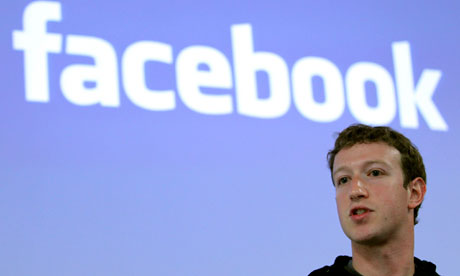
Facebook CEO Mark Zuckerberg's ambitions for the site to hit 1 billion users may be thwarted by the slowdown in numbers. Photograph: Robert Galbraith/Reuters
The number of people using Facebook has dropped in the UK for the second month in a row, mirroring similar falls in the US, Canada and Norway, giving the first signs that the social network's popularity may be waning in the west.
The website continued to grow worldwide, hitting an all-time high of 687 million users, according to data from the tracking company Inside Facebook, which uses Facebook's own advertising tools to determine the number of people using the site every month. Growth slowed however, having risen by 13.9m accounts in April and then just 11.8m in May. Typically in the past year it has grown by 20m a month. That slowdown could thwart founder Mark Zuckerberg's ambition to reach 1 billion users worldwide, despite his prediction last June that "it is almost a guarantee that it will happen".
Growth in Facebook use seems to peak in any country once the site is used by roughly half of those who have internet connections – though with more than 2 billion people online worldwide, the site could still reach the 1 billion figure. However, it would need people who have joined the site to stay with it – and that hasn't been happening in some countries.
Magnus Hoglund, chief executive of the law media portal Law360.com, who has worked on digital media companies for the past decade, said: "From my experience, I get the sense that being on Facebook is not cool anymore. The early adopters and trend setters are moving away. [But] these are also exactly the type of people brand advertisers want to reach; if they are leaving, it doesn't look good for Facebook."
The site has been criticised in the west for its approach to users' privacy, with repeated protests about the way in which controls on data access are relaxed. Last week the revelation that it had extended an automatic facial recognition system for tagging photos beyond the US without asking people if they wanted to opt in drew criticism from privacy groups and security consultants.
A spokeswoman for Facebook said: "We are very pleased with our growth and with the way people are engaged with Facebook. More than 50% of our active users log on to Facebook in any given day."
The drop in use was most marked in the US, where numbers fell from May's 155.2 million, just under half the 239m people online, to 149.4 million at the start of June. It marked the first time in a year that the number of people logging into the site over a month had fallen. In the UK, the fall was smaller at around 100,000 users to 29.8 million, or 58% of the 51.4 million people online. Canada saw a fall of 1.62 million to 16.6 million, while Norway also saw a fall of around 100,000 users over the month.
The fastest-growing countries, including Brazil and Mexico, grew at a maximum of 10% over the month.
The fall in users is most marked in those developed countries where Facebook first launched to the public in September 2006, after its first two years when it catered only to US college and high school users.
Eric Eldon, one of the researchers at Inside Facebook, said that it was hard to see how the social networking site could hit its 1 billion target except by getting into China, which has 420 million internet users but just 391,000 Facebook users as of March. The site has been banned in China since 2008, while cloned versions abound inside the country. Zuckerberg visited China in December 2010, which led to speculation that he was working on a way to get the site approved by the government, but there has been no further detail on whether that is happening.
Facebook still dominates the world in terms of social network use, with Russia and China marking the biggest holdouts where home-grown networks are the most popular.
Hoglund added that following the stock market flotation of LinkedIn, Yandex and Groupon's plans to go public, this summer could mark the high-water mark for media and technology market offerings as firms rush to cash in before their capital runs out.
Meanwhile, reports in the US suggest that Facebook may have to make a public share offering at the beginning of 2012 because it will have more than 500 shareholders. US securities exchange commission rules oblige companies to make a listing once they passed this threshold. Facebook did not respond to the Guardian on the issue.

No comments:
Post a Comment